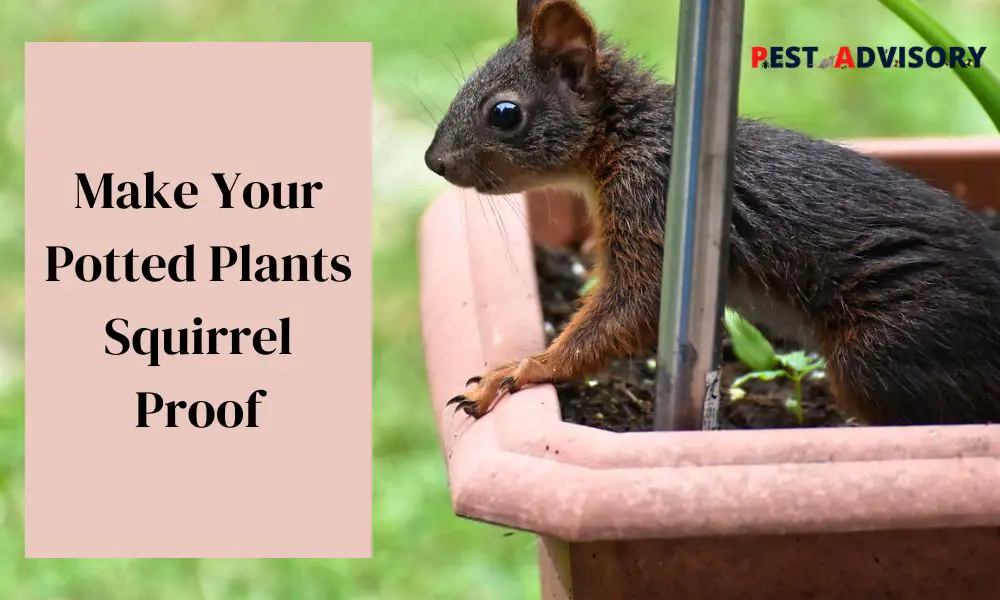Last year my potted plants suffered great damage at the hands, er, paws of squirrels. I was out of the station for the holiday. I left my house with bright-looking colorful potted plants with many flowers.
Sadly, I returned to a ransacked yard full of the tattered remnants of my beloved plants.
If you live in an area frequented by squirrels, your plants are at risk too. To take accurate actions you need to know the signs and reasons for squirrel intrusion.
Important Note: If you're tired of pests and want a reliable solution, then you should definitely consider seeking help from a professional pest control company. DIY solutions can be effective, but if you're dealing with a significant pest infestation, you don't want to rely solely on DIY methods. Pest control companies typically don't charge huge fees. You can fill out this form to receive free quotes from the top local pest control companies, and compare the quotes and see for yourself. Then, finally, your pest problems will be eliminated for good.
In this article, we have discussed the same as well as some remedies to keep squirrels away from your plants.
Why Do Squirrels Dig Into Flower Pots
Squirrels are known to dig into flower pots for various reasons, including:
Searching for Food
Squirrels are omnivorous and will eat a wide range of food, including nuts, fruits, seeds, and insects. They may dig into flower pots looking for food, especially if they have exhausted their usual food sources.
Storing Food
Squirrels have a habit of storing food for the winter months. They may dig into flower pots and bury food items like nuts or seeds in the soil of the pot for later retrieval.
Nesting
Squirrels may also dig into flower pots to create a nest or burrow for themselves or their young ones. The pot’s soil can provide a comfortable and safe place for them to nest.
Seeking Moisture
Squirrels require water to survive, and they may dig into flower pots to find moisture in the soil during dry weather conditions.
Which Plants Attract Squirrels and Why?
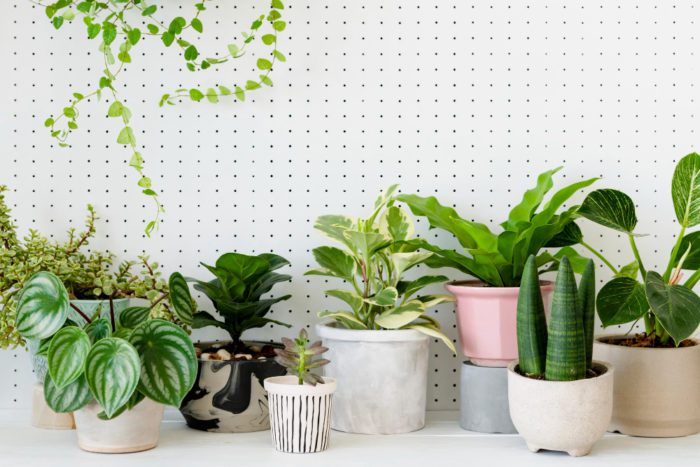
Squirrels are attracted to all kinds of plants. If not for feeding on parts of the plants, just as a playground for their chasing games. The most common plants where squirrels are seen foraging are:
- Sunflower– The seeds of this plant is one of the greatest allure for squirrels.
- Hibiscus plants- These have dark green leaves. Squirrels love eating these leaves.
- Tulips– This is one of the brightest spring flowers. Spring is also the most comfortable time for squirrel activities. Tulips attract squirrels with their bright colors. Though these critters are more likely to dig up bulbs and eat them.
- Hostas– These are perennial plants with succulent leaves. Squirrels love to feed on them as well as dig up roots and newly planted bulbs.
- Petunias– Squirrels are known to munch on the bright petals of this plant if there is nothing else to eat in your yard.
- Knock out Roses– Squirrels eat the buds and shoots of these disease-resistant plants.
Apart from these feeding reasons, squirrels can also dig into your potted plants to stash their store of nuts, berries, seeds, etc.
They also dig in potted plants for creating deception caches. In this process, they dig holes and cover them with mud without putting any food inside. This they do to mislead any eavesdropping squirrel.
Signs of Squirrel Invasion in Your Potted Plants
Many times infestation of insects like plant-eating beetles might be confused with squirrel problems. To avoid such mistakes look for these signs:
- A prominent sign of squirrel intrusion is random holes dug in your plant pots. Squirrels love bulbs of new plants. Often they dig in your plant seeking them thus damaging the entire setup.
- Squirrels love eating the leaves of many plants. So if you see large chunks of leaves missing, that appear to be torn out, it is likely you have a squirrel problem. (in the case of insects feeding you will see small parts of leaves eaten away at).
- Squirrels like the taste of some flowers too. So you might see petals of flowers lying around with the flower itself not there anymore.
- Sometimes squirrels dig up roots of potted plants to eat too.
Ways to Keep Squirrels Away from Potted Plants
Natural Squirrel Repellents
It is not always possible or safe to use chemicals to repel pests like squirrels. Here are some natural remedies you can use to keep squirrels away from your potted plants.
Pepper Spray/Hot Sauce
Squirrels have sensitive senses so use that to make them uncomfortable.
In a bottle of hot sauce, add some water. Keep adding till the texture is flowy enough. Shake well. Then spray that fluid on your plants’ leaves, flowers, and even on the ground.
Grind some cayenne peppers or chili flakes. Add water to it till the texture of the fluid is sprayable. Then spray it on your plants.
The squirrels cannot take the hot taste. And once they try it, they are unlikely to taste it again and thus will keep away from foraging in your potted plants.
Tip: Add a few drops of liquid soap to the mixtures. This will ensure that the mixture sticks to the leaves etc.
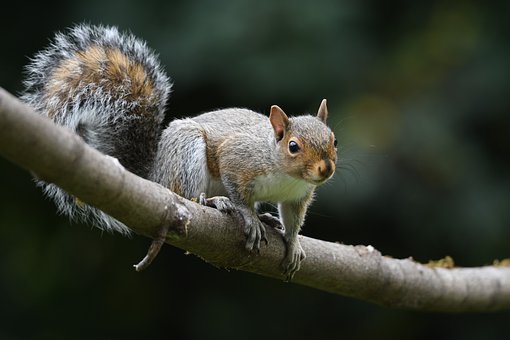
Use Garlic
We all know how strongly garlic smells. Fortunately, even squirrels think that. While some of us love having garlic, rodents cannot take it.
So spread some garlic cloves on or around the potted plants. The garlic odor will keep the squirrels away from the plants.
Coffee
Squirrels do not like the odor of coffee. So if you have some coffee beans to spare or even coffee powder, you can spread some on the soil of the plants.
Water
Squirrels hate getting wet. So set up a motion-triggered water sprinkler.
As soon as the squirrel approaches your plants, the sprinkler will spray them with water till they move away.
Plant Alternatives
Some plants repel squirrels with their natural odor. So if you spare some pots for planting these shrubs and herbs in between your beloved flower pots, this too can keep the squirrels away.
Some of the plants that squirrels do not like are mint, Galanthus, allium, and daffodils. Plant these and see how the squirrels react!
Scare The Squirrels
Squirrels are one of the smallest and most vulnerable creatures. So almost all animals around them are predators to them especially if it’s a dog or bird of prey like owls and hawks. Use that to repel them.
Your Pets
If you have a pet dog then train it to chase and scare away squirrels. Put it somewhere near your potted plants as a sentry so that whenever a squirrel dares to approach the plants it will be scared of the predator’s presence.
Or you can collect some furs shed by your pet (predator species) and sprinkle those around your potted plants. This too gives the predatory sense to the area that alerts and warns the squirrel to stay away.
Dummies
You can set up a plastic model or statue of an owl or hawk or eagle. The critters will not be able to tell the difference if it is real or not. But they are unlikely to encroach on the larger bird’s territory and will opt to stay away.
Tip: Make the model light so that it can sway in the breeze. Paint huge black eyes to make it look real. And ensure that you move the model around so that the squirrel does not get used to the predator’s single position.
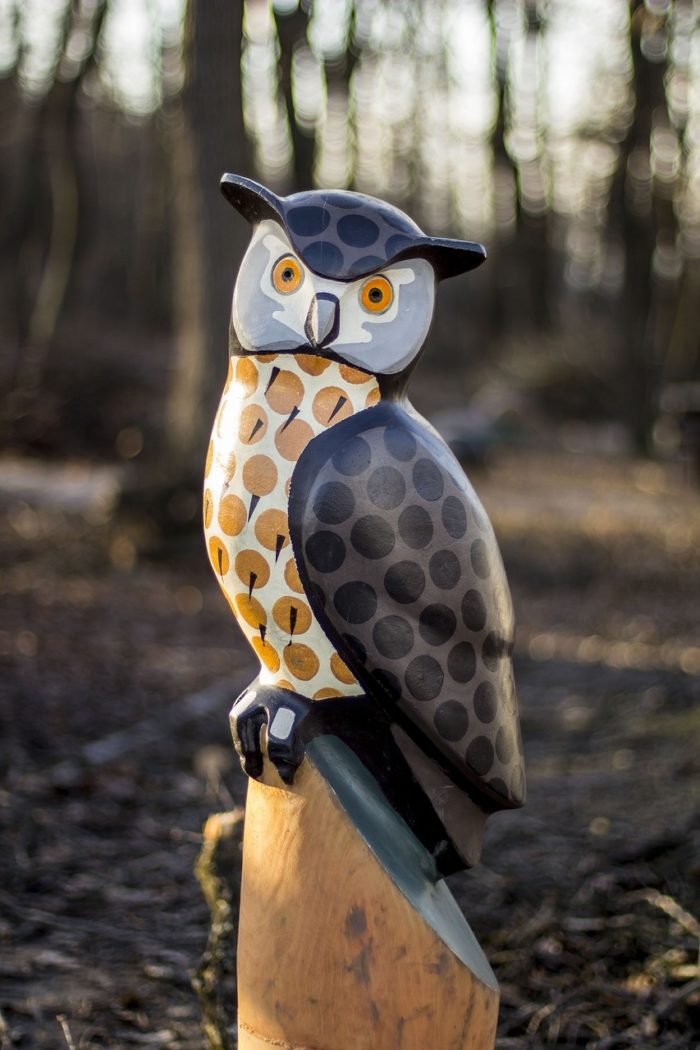
Alarms
You can also set up motion-triggered alarms. So when the squirrel approaches the plants the alarm will blare and this might scare them away.
Noise
You can also set up a radio and keep it switched on during daylight hours. This will give the squirrels an illusion of human presence nearby and they will think twice before coming to destroy your potted plants.
Protect your plants
Another way to keep squirrels away from your plants is to create barriers between them and the plants.
One sure way to achieve this is by covering your plants with a cage made of chicken wires, a plastic bird net, or a hardware cloth.
Trap them
If nothing works you can invest in some squirrel traps. You can catch them and release them far away from your houses and neighborhood. Preferably in a park or woods.
But there are a few technicalities you need to keep in mind before attempting this. First, we must find out if the trapping and relocating of wildlife are legal in your state.
Secondly, talk to a local wildlife expert about the trapping of the rodents and the possible repercussions of relocating them to a different area. This is an area of concern because there have been reports that squirrels unable to cope in new habitats have died in many cases.
So if you have solved the above problems and have got the green signal in both cases, then only try trapping squirrels. This should be your last resort. You can either buy a trap from the market or make your squirrel trap. But also ensure that the trap does not harm the critter in any way.
Precautions
- Natural squirrel repellents are time-sensitive. They are also not resistant to water. So to get the best results we need to reapply them after some time and especially after a bout of rain. Because rain tends to wash away the scent along with the spray.
- Make sure that you wash your hands thoroughly after making the pepper mixture. Or else if you touch your face with that hand, it is going to burn like anything.
- If you are using squirrel traps, you have to engage in diligent monitoring. You also need to be very careful while releasing the squirrels because trapped animals are prone to aggression.
- Make sure that the materials you use as enclosures for your plants are hardy enough and that the squirrels are not able to gnaw through them.
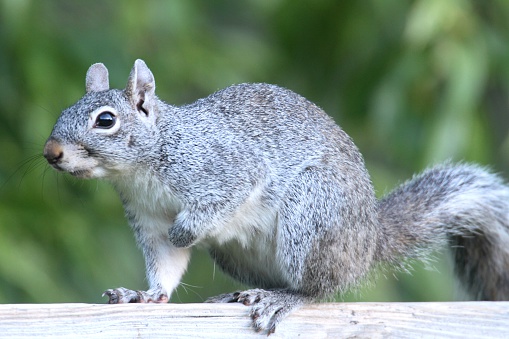
Final Words
Now that you know the reasons and signs of squirrel invasion, the plants that attract them, and the solutions that can work for your pots, we hope you get rid of the creatures.
Try them out. But ensure that you keep trapping squirrels as the ultimate backup plan. Try everything before going to this. And always keep in mind the precautions.
Hope this article could erase some of your concerns.

